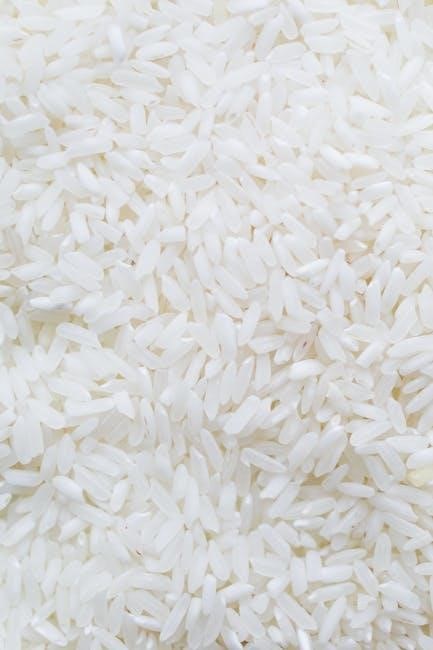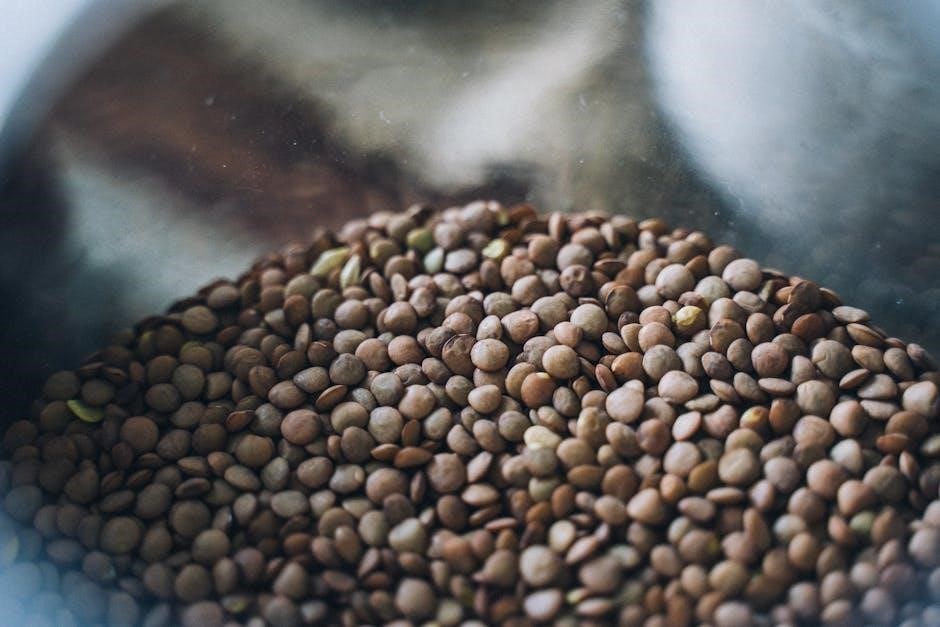A bulking diet plan is a structured approach to gaining muscle mass through strategic calorie surplus and nutrient-rich meals. Designed for bodybuilders and athletes, it focuses on consuming more calories than burned to support muscle growth. The plan emphasizes balanced macronutrients, whole foods, and consistency to maximize lean gains while minimizing fat accumulation. Customizable for individual needs, bulking diets cater to various weight ranges, activity levels, and dietary preferences, ensuring sustainable muscle development over time.
Understanding the Bulking Diet
A bulking diet is a nutritional strategy focused on gaining muscle mass through a calorie-surplus eating plan. It involves consuming more calories than the body burns, with an emphasis on nutrient-dense foods to support muscle growth. The diet is tailored to individuals seeking to increase lean body mass, particularly athletes and bodybuilders. Unlike traditional weight gain methods, bulking prioritizes quality over quantity, emphasizing whole foods like proteins, carbohydrates, and healthy fats. This approach minimizes fat accumulation while maximizing muscle synthesis. The diet is flexible, accommodating various lifestyles and preferences, including vegetarian and vegan options. By balancing macronutrients and maintaining consistency, a bulking diet helps achieve sustainable muscle development, making it a cornerstone of bodybuilding and strength training regimens.
Key Principles of a Bulking Diet
A successful bulking diet revolves around maintaining a calorie surplus, balancing macronutrients, and prioritizing whole, nutrient-dense foods. Consistency and patience are crucial for sustainable muscle growth.
3.1 Importance of Calorie Surplus
A calorie surplus is the cornerstone of any effective bulking diet, as it provides the energy needed for muscle growth and repair. Consuming more calories than your body burns ensures that your muscles have the necessary fuel to recover and develop after intense workouts. Aim for a modest surplus of 250-500 calories daily to promote lean muscle gain without excessive fat accumulation. Tracking your weight weekly helps determine if your surplus is effective. Adjustments can be made by increasing portion sizes or adding calorie-dense foods like nuts or dried fruits. Remember, patience is key, as steady progress yields the best results over time.
3.2 Optimal Macronutrient Breakdown
A well-balanced macronutrient breakdown is essential for effective bulking. Protein is foundational, with recommendations of 1 gram per pound of body weight daily to support muscle repair and growth. Carbohydrates should comprise 40-60% of total calories, providing energy for workouts and muscle recovery. Focus on complex carbs like whole grains, fruits, and vegetables for sustained energy. Fats, while less emphasized, are crucial for hormone production and should account for 20-30% of calories, primarily from healthy sources like avocados, nuts, and olive oil. Balancing these macronutrients ensures adequate nutrition for muscle growth while maintaining overall health. Proper allocation of protein, carbs, and fats optimizes energy levels and supports lean muscle development during bulking phases.

Creating a Bulking Meal Plan
Design a meal plan tailored to your caloric needs, ensuring sufficient protein for muscle growth, balanced carbs for energy, and healthy fats for hormone support. Use customizable templates or PDF guides to structure meals effectively, focusing on nutrient-dense foods to optimize gains and minimize fat accumulation.
4.1 How to Structure Your Daily Meals
Structuring daily meals for bulking involves distributing calories and nutrients evenly throughout the day to support muscle growth and energy needs. Start with a protein-rich breakfast to kickstart metabolism, followed by balanced meals every 2-3 hours. Include a pre-workout meal with carbs and protein for energy, and a post-workout meal with fast-digesting carbs and protein to aid recovery. Lunch and dinner should focus on whole foods like lean meats, fish, whole grains, and vegetables. Snacks like nuts, fruits, and protein shakes can help meet calorie goals. Aim for 5-6 meals daily, ensuring each contains a balance of protein, carbs, and healthy fats. Adjust portion sizes based on caloric needs and track progress to optimize gains. Staying consistent and organized ensures sustained muscle growth and overall health.
4.2 Sample 3000-Calorie Meal Plan
A sample 3000-calorie meal plan for bulking includes 5-6 balanced meals to maintain muscle growth and energy. Breakfast: 3 whole eggs, 2 egg whites, 2 slices of whole-grain toast, and a protein shake (500 calories). Mid-morning snack: Greek yogurt with berries and almonds (400 calories). Lunch: grilled chicken breast, brown rice, and steamed vegetables (600 calories). Afternoon snack: apple with peanut butter (300 calories). Post-workout shake: whey protein with dextrose (350 calories). Dinner: salmon, sweet potato, and green beans (550 calories). Bedtime snack: cottage cheese with pineapple (300 calories). Total: 3000 calories, with balanced protein, carbs, and fats. Adjust portion sizes based on individual caloric needs and progress. This plan ensures consistent nutrient intake for muscle recovery and growth.
4.3 Sample 4000-Calorie Meal Plan
A sample 4000-calorie meal plan for advanced bulkers includes high-calorie, nutrient-dense meals. Breakfast: 4 whole eggs, 3 egg whites, avocado toast, and a protein shake (700 calories). Mid-morning snack: protein smoothie with oats and almond butter (500 calories). Lunch: grilled steak, quinoa, and mixed vegetables (750 calories). Afternoon snack: trail mix with nuts and dried fruit (450 calories). Post-workout shake: whey protein with whole milk (400 calories). Dinner: baked salmon, mashed sweet potatoes, and broccoli (700 calories). Evening snack: full-fat Greek yogurt with honey (350 calories). Total: 4000 calories, with a focus on lean proteins, complex carbs, and healthy fats. Adjust portions to meet individual needs and monitor progress. This plan supports significant muscle growth and recovery for those with higher caloric requirements.

Tracking Progress and Adjustments
Tracking progress is essential for a successful bulking diet. Monitor weight weekly, aiming for a gain of 0.5-1 pound per week for lean muscle growth. Adjust calorie intake based on progress: add 200 calories if weight gain stalls, or reduce 100 calories if gaining too fast. Use a food scale for portion accuracy and track macronutrients to ensure balanced intake. Regularly assess body composition and strength gains to gauge effectiveness. Adjust meal portions or food choices to maintain a calorie surplus while minimizing fat gain. Utilize apps like MacroFactor for precise tracking and adjustments. Stay consistent, but be patient, as progress may slow over time. Regular adjustments ensure the diet remains optimized for muscle growth and overall health.
Types of Bulking Approaches
There are several approaches to bulking, each catering to different goals and preferences. Clean bulking focuses on nutrient-dense, whole foods with a modest calorie surplus to minimize fat gain. Dirty bulking involves consuming high-calorie, often processed foods to maximize weight gain quickly, though it leads to more fat accumulation. Lean bulking strikes a balance, emphasizing a slight calorie surplus with careful macronutrient control to prioritize muscle growth. Other methods include intermittent fasting or ketogenic diets, though these may hinder muscle gain. The choice depends on individual goals, genetics, and lifestyle. Each approach requires consistency and adjustment to optimize results. Understanding these methods helps tailor a bulking plan that aligns with personal preferences and objectives for muscle growth.

Role of Supplements in Bulking
Supplements play a supportive role in a bulking diet, helping to meet high nutritional demands and enhance muscle growth. Protein powder is a cornerstone, providing convenient, high-quality protein to meet daily targets. Creatine is widely used to boost strength and endurance during workouts. Mass gainers are calorie-dense supplements designed for those struggling to consume enough food. Branched-Chain Amino Acids (BCAAs) may reduce muscle soreness and support recovery. While supplements can enhance a bulking program, they should complement, not replace, a well-structured diet. Choosing the right supplements depends on individual goals, budget, and dietary needs. They are most effective when combined with consistent training and proper nutrition, helping to accelerate progress and maintain performance.

Maintaining a Sustainable Diet
Maintaining a sustainable diet during bulking involves balancing calorie intake with nutrient-dense foods to support muscle growth without overstraining. Focus on whole, minimally processed foods like lean meats, fish, eggs, whole grains, fruits, and vegetables. These provide essential vitamins, minerals, and fiber, promoting overall health. Aiming for 80-90% of calories from whole foods ensures optimal nutrition, while allowing 10-20% for treats. Regular meal planning and preparation help maintain consistency, preventing reliance on unhealthy options. Adjusting portion sizes and food choices as progress is tracked ensures the diet remains effective and enjoyable. Sustainability also involves listening to your body, ensuring adequate hydration, and managing digestion to avoid discomfort. This approach supports long-term muscle growth and overall well-being without sacrificing dietary balance or satisfaction.
Common Mistakes to Avoid
When following a bulking diet plan, several common mistakes can hinder progress. Overeating unhealthy foods, known as “dirty bulking,” often leads to excessive fat gain and poor health outcomes. Neglecting balanced macronutrients is another error, as insufficient protein or excessive carbohydrates can impede muscle growth. Inconsistent calorie intake, such as under-eating or irregular meals, fails to sustain a necessary surplus for muscle development. Additionally, inadequate hydration and insufficient sleep negatively impact recovery and growth. Relying too heavily on supplements rather than whole foods can also be counterproductive. Tracking progress without making adjustments prevents optimal results. Avoiding these pitfalls ensures a more effective and sustainable bulking journey, promoting lean muscle gain and overall well-being.

Food Selection for Optimal Gains
Optimal food selection is crucial for effective bulking, focusing on nutrient-dense, minimally processed foods. Prioritize high-quality protein sources like lean meats, fish, eggs, dairy, and plant-based options such as beans and legumes. Carbohydrates should come from whole grains, fruits, and vegetables, providing sustained energy and fiber. Healthy fats, including nuts, seeds, avocados, and olive oil, support hormone production and overall health. Whole foods ensure adequate micronutrients, while minimizing junk food intake prevents excessive fat gain. A balanced diet with diverse ingredients supports muscle recovery, growth, and long-term sustainability. Avoid overly processed or sugary foods to maintain a clean bulking approach, optimizing lean muscle gains and overall well-being.

The Importance of Consistency
Consistency is the cornerstone of a successful bulking diet plan, as muscle growth and strength gains occur gradually over time. Irregular eating habits and sporadic training can hinder progress, making it essential to adhere to a structured routine. Skipping meals or deviating from your calorie surplus can slow muscle development, while neglecting workout schedules disrupts muscle stimulation. Staying committed to your bulking diet and training plan ensures steady progress. Tracking your intake and adjustments helps maintain consistency, allowing you to refine your approach for optimal results. Without consistency, even the most well-designed plans may fail to deliver desired gains, emphasizing the need for discipline and patience throughout your bulking journey.
